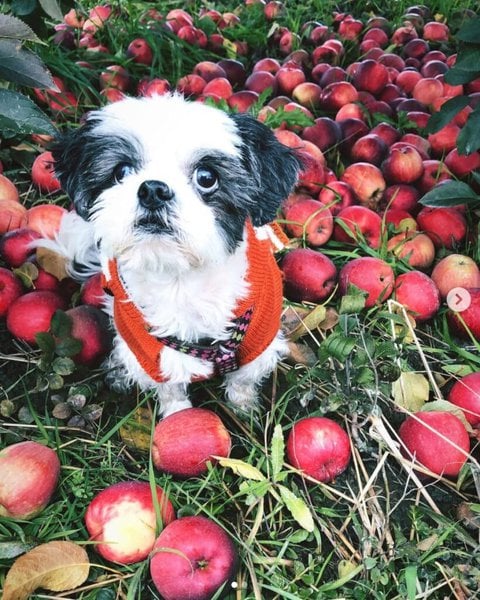The age-old adage “an apple a day keeps the doctors away” holds true for us humans since apples are a rich source of vitamins and minerals. But does it also apply to our furry pets? Does an apple a day keep the veterinarian away, too?
Yes, apples offer quite a number of health benefits and are a great occasional snack to treat your dog. Apples are packed with nutrients and have the ability to hydrate your fido as well.
But, there are some things you should take into account before giving apples to fido, such as how much and how often to give the fruit. Plus, your dog’s particular ability to digest it should also be considered.
In this article, we will discuss the health benefits that apples can contribute to your dog’s health, as well as, the precautions to know before you give this delicious fruit to your furry pet.
Why Are Apples So Good For Dogs?

This sweet and crunchy fruit, best eaten raw and fresh, has a lot going for it for your pet dog.
Whether it is the red or golden variety, such as the Red Delicious and McIntosh, or the tart and green ones, like the Granny Smith, apples can make your dog’s snack not only healthy but also satisfying.
Here are the four benefits of giving your dog a few slices of apple:
Highly Nutritious
While dogs need a well-balanced diet of good fats, protein, and carbohydrates, apples offer something extra that dogs would surely benefit from. This delicious fruit is a good source of vitamin C that eliminates harmful free radicals in the body and helps in reducing inflammation and cognitive aging.
Other vitamins in its arsenal include A, E, K, and B vitamins.
Aside from that, potassium is also present, which helps build muscle, calcium that strengthens the bones, and phosphorus that filters out wastes.
Additionally, an apple fruit has trace amounts of iron, manganese, magnesium, zinc, and copper that help in various metabolic processes in the body.
High In Fibers
Apples are also rich in both soluble and insoluble dietary fibers.
When dissolved, the soluble fiber pectin creates a gel that attracts cholesterol and sugar in the system, thus preventing its accumulation in the blood vessels.
Insoluble fibers, on the other hand, add bulk to the digesting food and hold water, making it easier to pass through the intestinal tract.
The skin of the apple is especially rich in insoluble fibers. Dogs suffering from constipation would benefit a lot from eating apples.
Antioxidant Benefits
Aside from the above-mentioned vitamin C, other antioxidants present in apples are quercetin, catechin, phloridzin, and chlorogenic acid.
These phytochemicals help in reducing inflammation and oxidative stress to the cells. This results in slowing aging and preventing a number of chronic diseases like heart disease, cancer, and diabetes.
The benefits of the antioxidants can be found in the skin of apples, so keeping it intact is again more favorable.
Improves Dental And Oral Health
Chewing apples can also help clean your dog’s teeth. Its crunchy and fibrous texture can stimulate their gums and reduce the buildup of plaque and tartar.
It also contains malic acid, especially the green variety, that keeps their breath fresh and teeth clean.
But, of course, this is no substitute for regular brushing, which is still your best bet for your dog’s dental care.
How Do I Feed Apples To My Dog?

The first thing to do is to wash the apples thoroughly in clean water to remove any pesticides, chemicals, and bacteria clinging to the skin. Then remove the stem, core, and seeds.
The tough stem and core are both choking hazards. Small dogs and puppies are especially vulnerable to gastrointestinal blockage if swallowed. The seeds, on the other hand, release minute amounts of the toxin cyanide when cracked or chewed.
Accumulation of cyanide in their system could pose a great health risk over time.
As for the skins, this is where most of the benefits are located, like fiber and antioxidants. Some dogs, however, can have adverse effects on the skin like diarrhea or indigestion, so peel the apples if this is so.
Finally, slice or dice the fruit in ways that would not cause choking. Some dogs just swallow and would not even chew the food that is given to them.
As an added treat during the summer months, some owners would freeze apple slices to beat the heat and add some extra liquids to prevent dehydration.
How Many Apples Can My Dog Have?
Fruits and other treats, in general, should only comprise 10% of their daily caloric needs. Excessive consumption of apples could cause diarrhea and stomachaches. A slice or two is enough.
Also, before giving apples to your dogs, make sure that they are not allergic to the fruit. If you notice swelling in their tongues, difficulty in breathing, coughing, or sneezing, then it may be suffering from an allergic reaction.

Can I Give Apple Pie To My Dog?
No, this is because of sugar and other ingredients in apple pie like nutmeg and butter. It is not highly recommended that you feed apple pie to your dogs.
Nutmeg, especially, has a substance called myristicin which can cause high blood pressure, hallucinations, and seizures. Plus, too much sugar and fats can cause obesity, diabetes, and all sorts of health problems.
How About Applesauce?
Yes, applesauce is fine as long as it is sugar-free.
Some dog owners cook it with a small amount of honey to add some sweetness and as a white sugar substitute.
Applesauce can be served frozen, added to their regular meal, or blended with other fruits like bananas and blueberries.






